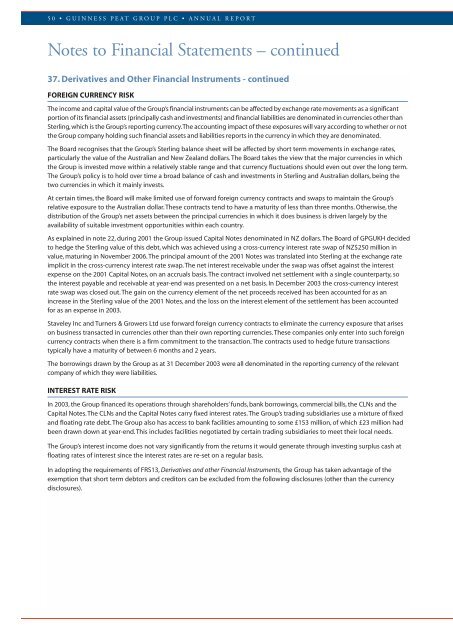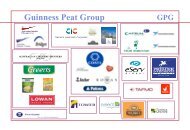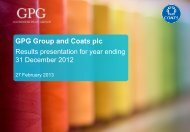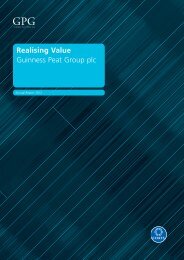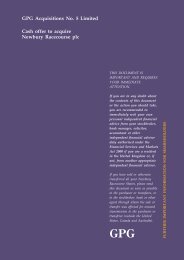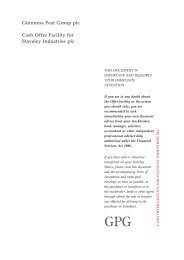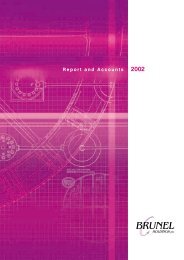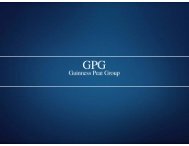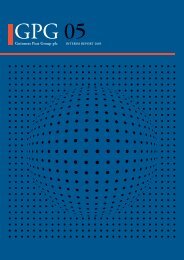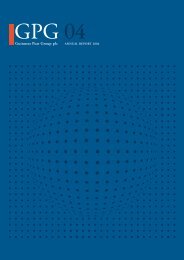GPG Report & Accounts 2003 - Guinness Peat Group plc
GPG Report & Accounts 2003 - Guinness Peat Group plc
GPG Report & Accounts 2003 - Guinness Peat Group plc
- No tags were found...
You also want an ePaper? Increase the reach of your titles
YUMPU automatically turns print PDFs into web optimized ePapers that Google loves.
50 • GUINNESS PEAT GROUP PLC • ANNUAL REPORTNotes to Financial Statements – continued37. Derivatives and Other Financial Instruments - continuedFOREIGN CURRENCY RISKThe income and capital value of the <strong>Group</strong>’s financial instruments can be affected by exchange rate movements as a significantportion of its financial assets (principally cash and investments) and financial liabilities are denominated in currencies other thanSterling,which is the <strong>Group</strong>’s reporting currency.The accounting impact of these exposures will vary according to whether or notthe <strong>Group</strong> company holding such financial assets and liabilities reports in the currency in which they are denominated.The Board recognises that the <strong>Group</strong>’s Sterling balance sheet will be affected by short term movements in exchange rates,particularly the value of the Australian and New Zealand dollars. The Board takes the view that the major currencies in whichthe <strong>Group</strong> is invested move within a relatively stable range and that currency fluctuations should even out over the long term.The <strong>Group</strong>’s policy is to hold over time a broad balance of cash and investments in Sterling and Australian dollars, being thetwo currencies in which it mainly invests.At certain times, the Board will make limited use of forward foreign currency contracts and swaps to maintain the <strong>Group</strong>’srelative exposure to the Australian dollar. These contracts tend to have a maturity of less than three months. Otherwise, thedistribution of the <strong>Group</strong>’s net assets between the principal currencies in which it does business is driven largely by theavailability of suitable investment opportunities within each country.As explained in note 22, during 2001 the <strong>Group</strong> issued Capital Notes denominated in NZ dollars. The Board of <strong>GPG</strong>UKH decidedto hedge the Sterling value of this debt, which was achieved using a cross-currency interest rate swap of NZ$250 million invalue, maturing in November 2006. The principal amount of the 2001 Notes was translated into Sterling at the exchange rateimplicit in the cross-currency interest rate swap. The net interest receivable under the swap was offset against the interestexpense on the 2001 Capital Notes, on an accruals basis. The contract involved net settlement with a single counterparty, sothe interest payable and receivable at year-end was presented on a net basis. In December <strong>2003</strong> the cross-currency interestrate swap was closed out. The gain on the currency element of the net proceeds received has been accounted for as anincrease in the Sterling value of the 2001 Notes, and the loss on the interest element of the settlement has been accountedfor as an expense in <strong>2003</strong>.Staveley Inc and Turners & Growers Ltd use forward foreign currency contracts to eliminate the currency exposure that ariseson business transacted in currencies other than their own reporting currencies. These companies only enter into such foreigncurrency contracts when there is a firm commitment to the transaction. The contracts used to hedge future transactionstypically have a maturity of between 6 months and 2 years.The borrowings drawn by the <strong>Group</strong> as at 31 December <strong>2003</strong> were all denominated in the reporting currency of the relevantcompany of which they were liabilities.INTEREST RATE RISKIn <strong>2003</strong>, the <strong>Group</strong> financed its operations through shareholders’ funds, bank borrowings, commercial bills, the CLNs and theCapital Notes. The CLNs and the Capital Notes carry fixed interest rates. The <strong>Group</strong>’s trading subsidiaries use a mixture of fixedand floating rate debt. The <strong>Group</strong> also has access to bank facilities amounting to some £153 million, of which £23 million hadbeen drawn down at year-end. This includes facilities negotiated by certain trading subsidiaries to meet their local needs.The <strong>Group</strong>’s interest income does not vary significantly from the returns it would generate through investing surplus cash atfloating rates of interest since the interest rates are re-set on a regular basis.In adopting the requirements of FRS13, Derivatives and other Financial Instruments, the <strong>Group</strong> has taken advantage of theexemption that short term debtors and creditors can be excluded from the following disclosures (other than the currencydisclosures).


